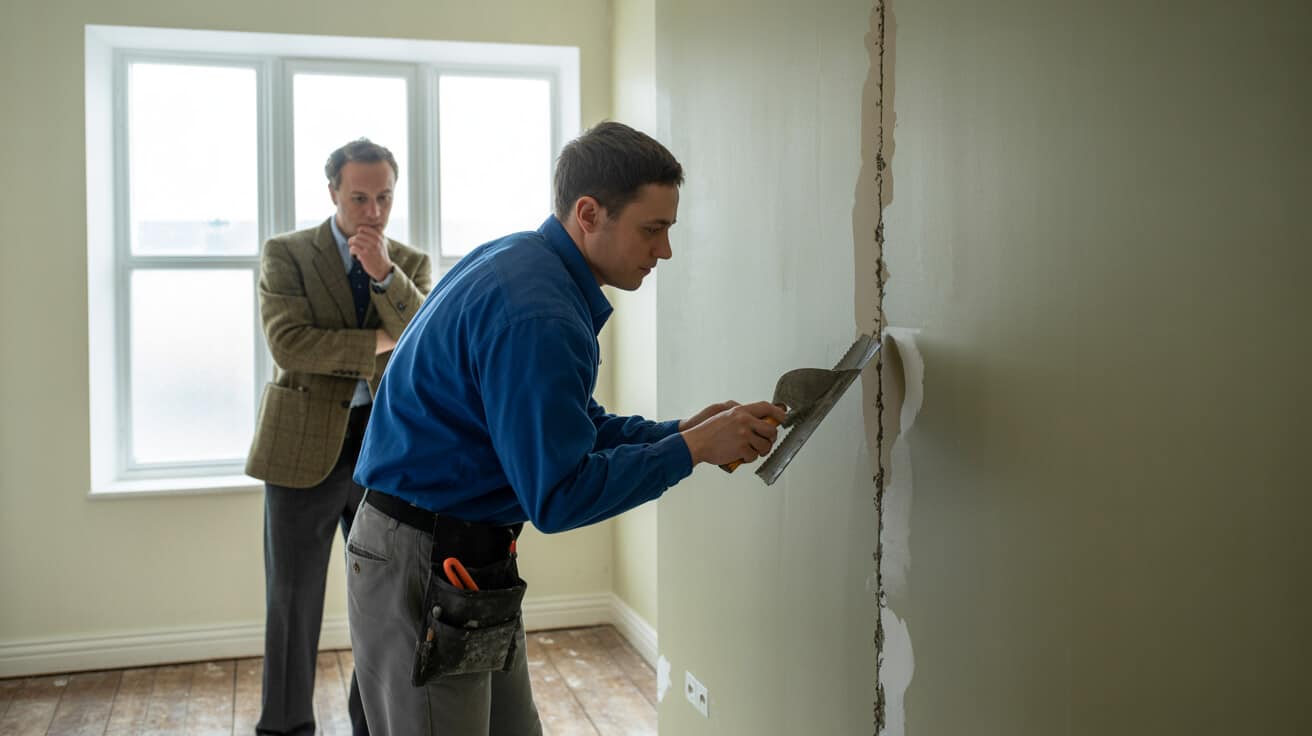 Landlord Vs. Tenant Responsibilities Who Fixes What
Landlord Vs. Tenant Responsibilities Who Fixes What

Who Actually Pays and Fixes What in a UK Rental? The Real-Line—Landlord vs. Tenant Responsibility, No Guesswork
Every day, a thousand tenancies hang on one hard truth: when something breaks, who steps up—and who foots the bill? You can wring your hands over “it depends,” but the law, regulators, and your wallet demand a straight cut. One mistake here means an asset’s value trickling down the drain, tenants living with headaches or hazards, and months locked in disputes nobody wants.
The fastest route to fewer arguments and safer homes? Know, without hesitation, who’s truly responsible for every fix.
This guide rips up the guesswork and shows you where the real boundary sits. Drawing from the latest UK law, actual dispute cases, and on-the-ground expertise from All Services 4U, you’ll finally get clarity—plain answers, quick-decision tools, and expert tactics to resolve issues fast and stay one step ahead. Whether you’re a property owner, landlord, contractor, facilities manager, or sitting tenant, the line between “your job” and “theirs” is about to get sharp.
What Does UK Law Actually Say—And What Trumps Everything Else?

If you’re searching for a “fair share” or whatever the tenancy says, you’re missing the point: the law stands above any contract or handshake. Landlords have non-negotiable, legally enshrined repair duties. Tenants, meanwhile, must act responsibly—but never pick up the landlord’s legal tab:
The Legal Bottom Line
- Landlord Duties (Section 11 LTA 1985): Responsible for the structure (walls, roof, floors, windows), the fixed systems (gas, electrics, plumbing, heating), and all “installations” that make the home habitable—throughout the tenancy, not just on move-in *(Shelter UK)*.
- Tenant Duties: Keep things clean, operate supplied systems properly, clear minor blockages or waste, and avoid letting preventable problems snowball *(NRLA)*.
- Can the Agreement Change the Law?: No. You can’t contract out of key landlord obligations. If your lease claims you must “service the boiler annually,” but the law pegs this as landlord-only, the law wins. End of storey.
If you’re stuck, compare your contract to the big rulebooks: Shelter, NRLA, Citizens Advice, and your local council’s guidance. Legal lines harden around what you can prove—photos, written records, service logs—not what you wish you’d sorted.
Ambiguity is expensive. When contracts clash with law or logic, it’s the evidence—and up-to-date compliance—that wins.
Which Repairs Are Landlord-Only—And Why is That Non-Negotiable?

If it’s about the property’s structure, safety, or what makes it habitable—that’s 100% on the landlord. No ifs, no loopholes.
Landlord Must-Do Repairs (UK Standard)
- Building Envelope: Walls, windows, roof, doors, foundations, external pipes and drains.
- Safety-Critical Systems: Fixed wiring, sockets, switches, boilers, central heating, radiators, water/gas pipes.
- Essential Installations: Toilets, basins, baths, showers—anything hard-plumbed or hard-wired.
- Critical Alarms: Mains-powered smoke and CO alarms (not battery swaps).
- Emergencies: Burst pipe, failed boiler in winter, dangerous electrics—landlord arranges certified pro, timeline = 24–48 hours max.
- Qualified Trade Only: Gas = Gas Safe registered; electrics = NICEIC-certified; fire or damp = specialist.
You cannot pass these off to tenants. Failing here triggers enforcement: councils can order repairs, stop evictions, claw back rent, or revoke HMO licences (GOV.UK).
Trying to dodge the law eats profit—the bill multiplies with fines and asset damage, not to mention reputation.
| Issue | Who Fixes? | Why? |
|---|---|---|
| Collapsed roof tile | Landlord | Structure & weatherproofing (statutory) |
| Boiler breakdown (no heat) | Landlord | Habitable standard (must fix quickly) |
| Mains socket sparking | Landlord | Safety—certified repair only |
| Leaking main pipe | Landlord | Water supply, property risk |
If the broken thing threatens health, safety, or the basic function of the property, it’s not a grey area—it’s landlord territory. Always.
What Jobs Are Squarely on Tenants? (And What Happens If They Slip?)

You might hear “tenant-like manner” thrown around—here’s what it means in reality: routine care, basic replacements, and fixing any damage you cause.
Tenant’s Expected To-Do List
- Cleaning + Routine Care: Floors, surfaces, appliances kept tidy; garden kept as you found it unless the agreement says otherwise.
- Minor Blockages: Sink hairs, small drain clogs, simple plunger jobs.
- Bulbs, Fuses, Batteries (where accessible): Swap them out.
- Damage You Cause: Smash a window, flood the bath—your responsibility to fix or pay to put right (often deducted from deposit).
- Reporting Problems: Spot issues early, report in writing (with photos). Delay—and you could be liable for additional cost if things get worse.
Going DIY on electrics, gas, or anything structural is a trap—don’t do it. Wrong move = voided insurance, breach of contract, real danger. Always ask first.
| Tenant Task | Is it Tenant’s Job? | Guidance |
|---|---|---|
| Replace lightbulb | Yes | As long as accessible/supplied |
| Clear minor clog | Yes | Try a plunger, report if persists |
| Deep clean carpets | Usually | Check contract details |
| Replace lost keys/fob | Yes | You arrange and pay |
Insist on clear reporting methods—email, online portal, written note. Photos are your insurance policy against blame games.
Common Disputes Settled—Who Fixes What? (Scenarios You’ll Actually See)

The rules tighten when real-life hits. Here’s how pros at All Services 4U parse the chaos so nobody gets the short straw (or the big bill):
Typical “Who Fixes It?” Scenarios
Water & Plumbing
- Leaking tap, slow drain?: Tenant tries to clear minor blockages, then reports if it persists.
- Leaking/burst pipes?: That’s the landlord—tenant should contain spread, document, and call immediately.
- No hot water, radiator cold?: Landlord. Speed matters, especially for vulnerable people or winter months.
Power & Electrics
- Blown fuse, trip reset?: Tenant, if it’s a simple consumer unit switch or plug fuse, with clear access.
- Dead socket, constant tripping, bare wires?: Landlord. Certified electrician only, no tenant DIY allowed.
Security & Access
- Broken lock, smashed window (not tenant fault)?: Landlord sorts; tenant ensures security and reports ASAP.
- Lost keys, lockout?: Tenant pays for locksmith/new keys. Landlord must be informed.
Damp, Mould & Structure
- Mould from roof leak or cracked wall?: Landlord resolves the root cause, does repair, and treats aftermath.
- Condensation from drying clothes/poor airflow?: Tenant manages ventilation, reports if issue persists.
Appliances & Accessories
- Landlord’s appliances (white goods)?: Landlord fixes unless misuse is obvious and provable.
- Tenant’s own stuff?: Tenant’s job.
Alarms
- Landlord instals and tests before move-in: ; tenant tests, changes batteries, and reports faults as soon as possible.
If you’re ever unsure, ask: Does leaving it broken risk health, safety, or the property? If yes, it’s on the landlord.
Crystal Clear Reporting: How To Sidestep Blame, Delays, and “He Said, She Said”

A “quick call” rarely holds up. For repairs (or deposit disputes), it’s the official paper trail that shields both sides.
Reporting and Fix Process: No Excuses
- Report in writing always: Email, portal, or signed, dated letter. Details > guesses. Attach photos—what you see, they should see.
- Be precise: “Heating stopped in master bedroom, won’t switch on at wall, see photo 1.”
- Chase and escalate: Zero movement on emergencies (water, gas, power, heating) in 24–48 hours? Escalate fast—repeat email, copy in landlord/agent, or notify council for hazards.
- Log every step: Who did you notify, when, and by what method? Stack your folder—one well-kept record often decides deposit disputes and council interventions.
- Emergency moves: Landlord ignores a severe problem? Tenants can and should call Environmental Health at the council. They’re empowered to inspect, enforce, and ban “retaliatory” evictions *(Shelter UK)*.
A professional contractor (like All Services 4U) brings third-party reports, digital records, and legal-compliance guarantees for peace of mind.
A two-minute photo and a timestamped email outweigh an hour-long argument—proof always wins the day.
What Compliance Standards and Proof Must Landlords Keep Bulletproof?

If you’re a landlord and think “duty of care” is optional, the fines (and lost nights’ sleep) will teach otherwise. Your record-keeping is your shield:
Essential Compliance Moves
- Certificates always up-to-date: Gas (CP12), electrics (EICR), fire risk docs—ready for tenant perusal or council spot-checks.
- Maintenance and inspection logs: Each repair’s date, description, outcome, and the contractor’s registration/certification details. Easily produced if challenged.
- Qualified Traders Only: Don’t risk insurance or court action by employing unqualified trades. Gas Safe for gas, NICEIC for electrics—names and credentials on file.
- Deadline discipline: Emergencies (no heat, major leaks, dangerous wires) = fix inside 24–48h. Routine works = typically 7–14 days. Miss these; risk exponential liability.
Treat paperwork like an insurance policy: in the tribunal or PRT disputes, if it isn’t logged, it “never happened”.
| Compliance Standard | What’s Required? | Risk if Ignored |
|---|---|---|
| Gas Safety (CP12) | Annual, done by Gas Safe pro | Fines, invalid eviction |
| Electrical (EICR) | Every 5 years, NICEIC/EICR | Fines, rent repayment, ban |
| Fire & smoke alarms | On move-in, then tenant tests | Massive legal exposure |
| Maintenance Records | Digital + signed logs | Lost deposit protection |
For tenants: your own repair log (photos, emails, calendar) is your insurance—don’t rely on just their word.
The Real-World Playbook: Escalation, Emergencies, and No-Drama Resolution

When things stall or go sideways—whether through neglect, slow trades, or odyssey-length response times—here’s how smart clients and managers flip the script:
The Fastest Way Through Delays and Disputes
- Record and escalate instantly: Place the issue in writing, name the urgency, snap photos. Keep escalating if deadlines pass or risk to health/safety rises.
- Repeat, document, and involve authorities: For emergencies, one missed 48h window = move straight to council or ombudsman notification.
- Bring in credible, neutral trades: Hiring a regulated, impartial specialist carries more weight (in tribunals and repair negotiations) than DIY hacks or friends doing a “favour.”
- Stay cool and consistent: Reputation builds when you out-communicate—not out-shout. Open lines and measured follow-up deescalate drama and leave fewer headaches for all.
What usually inflates costs? Letting a dispute sit quietly instead of swinging into neutral, documented action. Prevention is cheaper than firefighting, every time.
Ignore the problem and it grows interest—ignoring your gut on timely action costs more than any call-out.
Professional Advice from the Field: Hector Gauge’s No-Fuss Repair Wisdom
🛠️
- Assess risk first: Before grabbing tools, scan for danger: electrics, water, gas, visibility. If in doubt, step back, isolate, and get safety confirmation.
- Don’t let low-level problems fester: Loose fittings, minor leaks, or sticky locks? Early attention stops spiralling costs and later compliance risk.
- Document, always: One dated photo + a quick email = rapid proof in disputes. For landlords, it’s your legal cover; for tenants, it’s your deposit rescue net.
- Respect the clock: For emergencies (leaks, power, gas, security faults), expect a fix started in under 24 hours. For routine jobs, see movement in under a week—or escalate.
- Chase certainty: When you’re in a grey zone, request confirmation in writing from landlord, agent, or contractor. Assumptions multiply liability.
🛠️
Stepwise Repair & Compliance Checklist: Who, How, and When to Act
Step 1: Identify the Real Issue
- Is safety, habitability, or value at stake if left unchecked?
- Is it apparent wear and tear, sudden damage, or misuse?
Step 2: Paperwork Proof
- Do tenancy agreements cover this issue? (Remember: law applies regardless.)
- Have valid certificates (gas, electrics, fire, deposit protection)?
Step 3: Proper Reporting
- Put it in writing—timed, clear, with attachments. Sketch the issue if photos miss details.
- Keep a log of all back-and-forth. Audit trails reduce disputes later.
Step 4: Escalate Intelligently
- If expectations aren’t met, chase. For emergencies, move quickly (council, ombudsman, reputable firms).
- Always build a documented chain for disputed costs or withheld deposits.
Step 5: Use Trade-Certified Pros on Anything Regulated
- Only certified contractors on machinery, structure, wiring, and gas. DIY stops here—go pro for compliance.
Routine, written, and traded—properties managed to this checklist avoid legal limbo and sky-high recovery costs.
Why All Services 4U Is the No-Hesitation Answer for Fast, Lawful Repairs
When fear and finger-pointing cost time, money, and peace, the answer is frictionless, expert-run, legally tight property care. All Services 4U reshapes the repair equation for UK landlords, managers, and tenants: the right person, the right way, the first time.
- Certified Engineers: City & Guilds, NVQ L3, fully compliant—DBS, IPAF, PASMA as standard.
- Clarity Over Gaps: Ever stared down a “grey area” dispute? Our multi-trade team, impartial advice, and transparent protocols erase confusion before it escalates.
- Total Documentation: Every job stamped with digital photos, audit-ready logs, and full compliance trails—proving both need and fix.
- 24/7 Real Emergency Response: Water pouring in? EICR or boiler panic? Call, WhatsApp, or book online—real-time tracking, stakeholder updates, and zero dramas.
- Asset-First Mindset: Routine checks, rapid repairs, and future-proofing plans to keep your investment sound and tenant relations strong.
- Proven Across FMs, Landlords, and Agents: Full-spectrum—residential or commercial, single flats to multi-site portfolios.
Take out the guesswork and the risk. If you want less hassle, fewer disputes, and certainty that every fix stands up in court—or just puts your property back on track—work with All Services 4U. Your asset, your compliance, your peace of mind—locked in from day one.
Frequently Asked Questions
What legal realities stop landlords from bypassing essential repair duties in UK rentals?
You cannot write away mandatory maintenance, no matter how creative your tenancy agreement may be. UK law locks landlords into the responsibility for structural soundness, essential services, fire and electrical safety from the first day a lease is signed—regardless of what any private agreement says. Statutes like Section 11 of the Landlord and Tenant Act 1985 and the Homes (Fitness for Human Habitation) Act 2018 are non-negotiable and override every clause that tries to swap landlord jobs with tenant tasks. Councils enforce these obligations with fines, forced repairs, and can even block evictions if the property fails legal standards.
The law doesn’t care what was privately agreed—miss a core repair and your credibility, not just your cash, is on the line.
Which specific legal powers always override private agreements?
- Section 11, Landlord and Tenant Act 1985: Landlords remain responsible for the property’s structure, sanitation, and critical services—there are no workarounds.
- Homes (Fitness for Human Habitation) Act 2018: Ensures standards for habitability cover damp, ventilation, cooking facilities, and safety at all times.
- Enforcement reach: Local councils, Tribunals, and even housing ombudsman can intervene, requiring repairs or penalising non-compliance—tenants have the legal upper hand when safety or health falters.
If a landlord attempts to push routine or urgent repairs onto a tenant—with any wording—the risk isn’t just a court case, but enforced correction of every mistake, often at substantial cost.
How does All Services 4U remove risk from the landlord role?
- Ensures all urgent works and compliance items are tracked and completed—fully documented for inspection.
- Delivers prompt-certified repairs, with legal paperwork as a safeguard in audits or disputes.
- Provides unbiased third-party reporting that stands up under scrutiny.
How do landlords and tenants split responsibilities for repairs, and where do most disputes begin?
Legal lines are clear in principle: landlords fix anything structural or essential, tenants tackle minor daily upkeep. In reality, confusion is common at the intersection of “wear and tear” or apparent misuse. The only way to fairly draw the line is to maintain clear records of what broke, why, and who was in control.
Landlord duties
- Major faults: wall cracks, roof leaks, failed heating, electrical hazards.
- Statutory checks: annual gas safety, EICR, smoke/CO2 alarm upkeep.
- Persistent problems: mould, rising damp, and system-wide drainage—where not caused by day-to-day misuse.
Tenant duties
- General cleaning, replacing safe-to-change bulbs, and handling everyday blockages (hair, small debris) in sinks or toilets.
- Accidental damage: where cause is proven and documented, liability falls to the tenant—deposit deductions must be justified with evidence.
- Minor wear: if a small fix becomes big because of neglect, landlords may share some responsibility, but always check tenancy documentation.
Disputes are rarely about major leaks—they start with a lost email, an unlogged call, or an assumption that someone else is responsible.
When does a neutral specialist become essential?
When accountability is unclear, independent assessment breaks the deadlock. All Services 4U supplies impartial compliance reports—tracking cause, assigning duty, and offering a digital trail that both landlords and tenants can rely on.
When do minor property issues trigger rapid legal response, and what repair speed do UK laws demand?
A minor leak or heating problem may not seem urgent, but UK law treats certain repairs as rapid-response priorities. Failure to attend to gas leaks, full heating/power outages, or water ingress within tight timelines puts landlords at risk of regulatory fines, rent repayment orders, or even the council stepping in to fix at the owner’s expense. If you miss these statutory triggers, insurance cover can vanish—and even the deposit scheme may rule against you.
- Gas or critical heating failure: Response mandated within 24–48 hours, faster in cold weather or for vulnerable residents.
- Major leaks, structural hazards: Landlords should act within hours; every delay raises repair costs and legal exposure.
- Electric or fire safety non-compliance: Missing a certification window can void insurance and break the legal contract.
Every hour counts. Landlords who document first action, contact time, and evidence of every repair dispute less, defend more, and avoid expensive surprises.
How does All Services 4U support urgent response?
- Engineers are available 24/7—faster than statutory requirement.
- Status and cause are logged with every visit; photo and paperwork sent to landlord and tenant in real time.
- No-repair is closed until it meets safety and compliance benchmarks.
What records and documentation protect landlords and tenants in UK property disputes?
Hard evidence beats memories during any dispute. For landlords, gaps in logs, missed certificates, or lack of photos lead directly to lost cases, fines, or gut-wrenching deposit returns. For tenants, reporting issues in writing with photos, and following up after fixes, helps secure a fair outcome if things go south.
Records proven to prevent disputes
- Log every repair request: date, time, issue, and responsible party.
- Photos before and after repairs, especially for system, structural, or safety fixes.
- Certificates: store digital copies (Gas Safe, EICR, Legionella, fire safety) and back them up—these are crucial in rent refund or insurance claims.
- Inventory snapshots: jointly signed, with clear evidence of pre-existing, new, or worsening damage at both check-in and check-out.
Paper trails—especially digital ones—don’t just defend cash. They amplify your reputation as a diligent owner or respectful tenant.
How does All Services 4U structure audit-proof records?
- Every repair cycle, from first report to completion, is logged in a secure portal available to all parties.
- Digital “evidence packs” include documentation of cause and assignment—key for resolving grey areas quickly.
- All records are ready to comply with deposit schemes, regulatory requests, or solicitor inquiries.
How do property professionals like Hector Gauge and All Services 4U stop disputes before they start?
Proactive effort trumps reactive firefighting. Experienced engineers spot issues before tenants or owners do—through scheduled checks, transparent boundaries, and education on problem signs. Smart landlords encourage digital reporting, even for minor problems, so no one loses track when small fixes become urgent.
- Six- or twelve-month walkthroughs catch trouble early, preventing most big repair jobs.
- Joint inspections and sign-offs clarify where responsibility sits, reducing ambiguity.
- Educational tips from engineers: tenants and owners learn how to check for leaks, test alarms, and handle temperature irregularities before they erupt into disputes.
The two-minute checklist almost always stops the two-month argument—clarity and evidence beat drama and guesswork.
What typical challenges does All Services 4U resolve preemptively?
- Boiler outages: prompt diagnostics and transparent communication keep both parties informed.
- Source-tracking: when damp or leaks appear, the root cause—structural or user-action—is always established before blame is assigned.
- Security issues: lock failures or window breaks are made safe first, repaired promptly, and documented throughout.
Which tables help UK landlords and tenants quickly agree on responsibilities before inspections?
| Repair/Issue | Landlord | Tenant | Both (Conditional) | Audit-Proof Action |
|---|---|---|---|---|
| Burst water pipe | ✅ | ❌ | Photo + urgent escalation | |
| No heating, power loss | ✅ | ❌ | Written/email report, timestamped fix | |
| Blocked drain (minor use) | ❌ | ✅ | Tenant-logged attempt, escalate if stuck | |
| Broken window/door | ✅ | ✅* | *If caused by tenant | Written summary, engineer notes, photo |
| Damp/mould (structural) | ✅ | ❌ | Joint photos, compliance doc, logged fix | |
| Condensation mould | ❌ | ✅ | Routine cleaning, tenant uploads photo | |
| Lost keys/tenant-caused loss | ❌ | ✅ | Tenant fixes, landlord cites in deposit | |
| Core gas/electric issues | ✅ | ❌ | Isolation, evidence, qualified repair | |
| Garden & outside (per lease) | ❌ | ✅ | Lease clause, mutual audit/photo log |
Knowing your duties before inspection is a win-win—owners avoid missed deadlines and lost rent, tenants sidestep costly disputes, and reputation is built on transparent results, not uncertainty.
What digital habits give busy owners and managers an edge in modern property maintenance?
Running a property (or portfolio) with your inbox as the main filing cabinet is a recipe for stress and missed legal deadlines. Leaders use digital job tracking, shared logs, and secure cloud compliance to ensure nothing is ever lost—no missed certificate, no undocumented job.
- Assign and track repairs instantly on a digital platform, so evidence is stored from the first sign of trouble.
- Use recurring reminders for annual compliance checks—gas, fire, electric, and specialist risk items.
- Share updates and photos at each step—owners, contractors, and tenants stay involved, avoiding surprises, delays, and finger-pointing.
Reputation follows results. Landlords and managers who embrace digital tools find fewer complaints, faster fixes, and better renewal rates.
Why do proactive owners choose All Services 4U?
- Instant notification and documentation of every job, interview, or compliance deadline—no lost paperwork, no lag.
- Real-time updates for every stakeholder, from caretaker to CEO.
- With full digital audit trails, busy property managers and landlords transform compliance from a worry to a selling point.
Ready to set a new standard for your portfolio? Join the growing community of UK property professionals using All Services 4U to build audit-proof, tenant-friendly, future-proof assets—request a compliance audit or schedule your next repair today.



